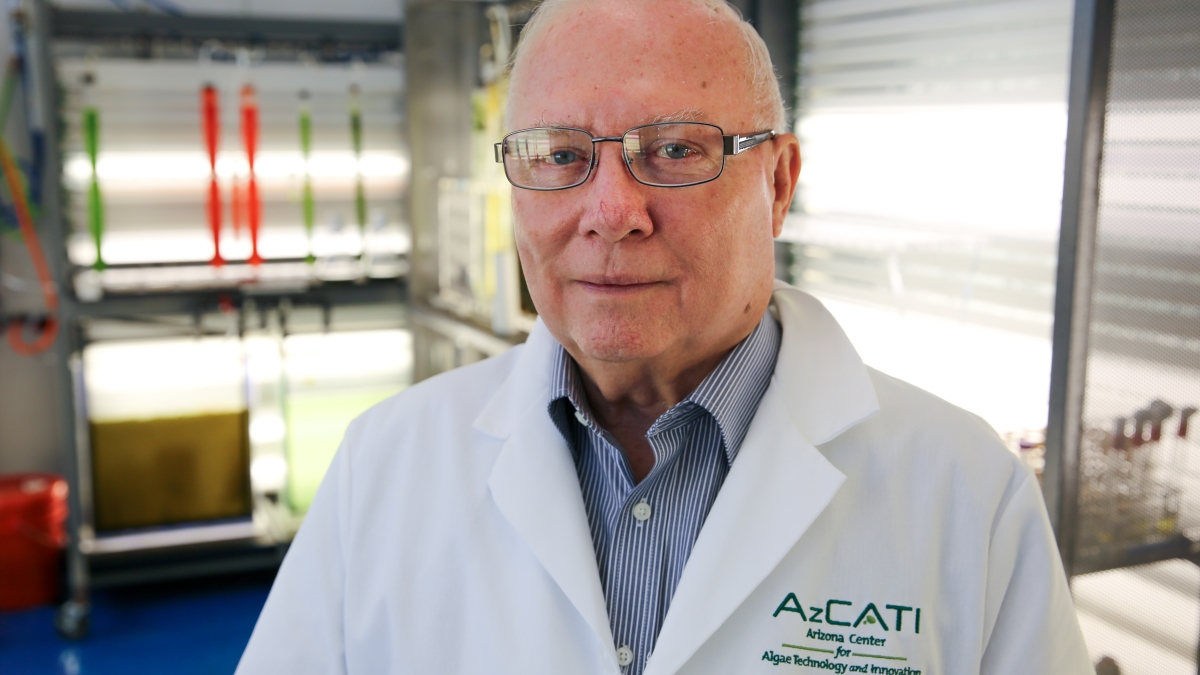Editor's note: Milton Sommerfeld, a professor at Arizona State University's Department of Applied Biological Sciences at the Polytechnic School, died on May 16. He was 76. Here, his life and work are remembered.
What’s so great about algae?
If you had the good fortune to meet Milton Sommerfeld, you have a hearty answer to that question.
Appropriately dubbed “The Wizard of Ooze,” Sommerfeld illuminated the world of algae with vibrant imagery, bubbling-good humor and — if you were lucky — a mouthful of algae cookie, freshly baked by his wife, Carolyn.
Sommerfeld unlocked algae’s potential, demonstrating its boundless possibility while leaving an enduring legacy of research, both at Arizona State University and well beyond its walls.
Catching the algae bug
Sommerfeld grew up in rural Texas on his family’s farm. Not only did this upbringing teach Sommerfeld the importance of hard work, resilience and integrity — virtues he continually demonstrated to his students and colleagues — it also introduced him to a specific slimy-green substance.
One of his designated farm duties was cleaning the cattle trough, which reliably flaunted a shiny coat of algae. Despite giving it a good scrub every week, the algae always returned. He puzzled at how and why it grew so fast.
Sommerfeld's interest in algae was really piqued when a fellow colleague asked him to evaluate the pond scum in his pool — not uncommon in the Phoenix metro area where private pools are nearly a necessity. The colleague asked Sommerfeld to help him prevent the scum from reoccurring, and a four-decade career in algae — from biofuels and bioproducts to toxins and bioremediation — was born.
An influential career
Sommerfeld enjoyed an expansive ASU career sparkling with accomplishment. During 48 years as a professor, his advancement to department chair, then to associate dean and finally to co-director of the Arizona Center for Algae Technology and Innovation (AzCATI), he kept education and research firmly at the foundation of his success.
Much of Sommerfeld's legacy lies in the inception of the Laboratory of Algae Research and Biotechnology (LARB), which later became AzCATI — a unit of ASU LightWorks, recognized as the first national test bed for outdoor algae cultivation. He was critical in developing the Algae Testbed Public Private Partnership (ATP3), now key to researchers and companies looking for third-party technology verification.
With AzCATI, Sommerfeld envisioned a place where students could gain the knowledge necessary to become tomorrow’s workforce in the expanding field of algal biotechnology, and that is precisely what it has become.
Welcome to Algae Inn
Inquisitive minds found great company in Sommerfeld, who was more than happy to entertain questions about algae. He delivered answers with such relish, even his colleagues felt like they were hearing them for the first time.
For this reason, Sommerfeld eagerly awaited ASU’s annual open house event — Night of the Open Door. He got ready by creating quizzes for kids and preparing algal product samples for other visitors.
Sommerfeld's impeccable sense of humor, replete with science jokes, made everyone’s trip to AzCATI memorable. He welcomed people from academia and industry, tirelessly giving tours to individuals and groups alike. Always using samples and examples, he made sure that everyone left with a clear understanding of why “we should all love algae.”
Love for education
Sommerfeld's love for education dates back to his time as a high school teacher, his first job after obtaining his bachelor's degree in biology from Southwest Texas State College. He spent two years teaching before beginning his doctorate in plant biology at Washington University in St. Louis. He later returned to education and remained there for the rest of his career.
As co-director of AzCATI, Sommerfeld developed an internship program that allows select high school students from ASU Preparatory Academy to spend a few hours a week at the facility. Here, they shadow graduate students and technicians while gaining invaluable lab experience before college. The concept has since extended to undergraduate ASU students — many of whom become research technicians after graduating.
In fact, Sommerfeld recently worked with former students to build algae-related graduate courses and hoped to one day establish an algae major.
A dedicated role model
Sommerfeld was always a fan of Monday morning meetings. He made sure to arrive five minutes early — punctuality being an attribute he always impressed upon his students — and to kick off meetings with gusto.
His passion and motivation were palpable to all who work with him, around him, and even to those who had only heard of him — forever embedded in his contribution to the center’s “I LOVE Algae” logo.
When taking a picture, Sommerfeld was known to substitute the standard “cheese” for “algaeeee.”
That’s the snapshot that those who had the great privilege to know Sommerfeld will always remember: a brilliant scientist with a keen sense of humor and big, infectious grin that radiated his joy for doing what he loved most.
Top photo: Milton Sommerfeld in the Arizona Center for Algae Technology and Innovation (AzCATI) at ASU's Polytechnic campus in spring 2016. Photo and video by Ken Fagan/ASU Now
More Science and technology

ASU professor breeds new tomato variety, the 'Desert Dew'
In an era defined by climate volatility and resource scarcity, researchers are developing crops that can survive — and thrive — under pressure.One such innovation is the newly released tomato variety…

Science meets play: ASU researcher makes developmental science hands-on for families
On a Friday morning at the Edna Vihel Arts Center in Tempe, toddlers dip paint brushes into bright colors, decorating paper fish. Nearby, children chase bubbles and move to music, while…

ASU water polo player defends the goal — and our data
Marie Rudasics is the last line of defense.Six players advance across the pool with a single objective in mind: making sure that yellow hydrogrip ball finds its way into the net. Rudasics, goalkeeper…


